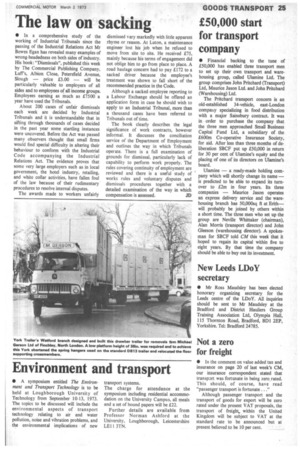The law on sacking
Page 27

If you've noticed an error in this article please click here to report it so we can fix it.
• In a comprehensive study of the working of Industrial Tribunals since the passing of the Industrial Relations Act Mr Bowes Egan has revealed many examples of wrong-headedness on both sides of industry. His book: "Dismissals", published this week by The Commercial Publishing Company, Luff's, Albion Close, Petersfield Avenue, Slough — price £3.00 — will be particularly valuable to employers of all sides and to employees of all income groups. Employees earning as much as £7500 a year have used the Tribunals.
About 200 cases of unfair dismissals each week are decided by Industrial Tribunals and it is understandable that in sifting through thousands of cases decided in the past year some startling instances were uncovered. Before the Act was passed many observers thought that small firms would find special difficulty in altering their behaviour to conform with the Industrial Code accompanying the Industrial Relations Act. The evidence proves that some very large employers such as in local government, the hotel industry, retailing, and white collar activities, have fallen foul of the law because of their rudimentary procedures to resolve internal disputes.
The awards made to workers unfairly dismissed vary markedly with little apparent rhyme or reason. At Luton, a maintenance engineer lost his job when he refused to move from site to site. He received £75, mainly because his terms of engagement did not oblige him to go from place to place. A road haulage concern had to pay £172 to a sacked driver because the employee's treatment was shown to fall short of the recommended practice in the Code.
Although a sacked employee reporting to a Labour Exchange should be offered an application form in case he should wish to apply to an Industrial Tribunal, more than a thousand cases have been referred to Tribunals out of time.
The book clearly describes the legal significance of work contracts, however informal. It discusses the conciliation service of the Department of Employment and outlines the way in which Tribunals operate. There is a full examination of grounds for dismissal, particularly lack of capability to perform work properly. The rules covering continuity of employment are reviewed and there is a useful study of works rules and voluntary disputes and dismissals procedures together with a detailed examination of the way in which compensation is assessed. JD




































































































